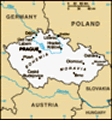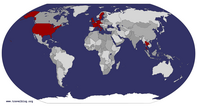Advertisement

 Venice
Venice
Can you feel the romance?Day 12: Venice
I wonder how long the novelty of having canals instead of roads, boats instead of cars, would last? As a one-off experience it is a wonderful novelty, tinged somewhat by the unpleasant spell of the canals, which are polluted with typical road rubbish. The romance of the city on water is palpable, but in terms of convenience I think it would probably be a nightmare. As tourists though, Venice was a througouly enjoyable city, both for the shear novelty of the cities layout (essentially a series of islands, loosely attached by bridges but ultimately connected by canals acting as roads) and the architectural beauty of the city.
Our day began with a walking tour of St.Marks square, the central square of Venice. The guide was a local - apparently a requirement of touring Venice - and was a bit of a shocker. She was quite and talked for far too long. So, we skipped away, which was a bit of a shame because I would have liked to learn more about the history of this unlikely city.
Anyhow, we had a look around the square, into some beautiful glass stores - Venice is very high
class - and admired the building, particularly the local bascilla (church). There were a couple of strange things about Venice, and this square in particular. Firstly, unlike the rest of the western world, they have a strong respect for the Pigeon. Apparently Venice was first discovered when Sailors spotted Pigeons about the land. So, the Pigeon is a Venetian icon and they cover the square. Secondly, they were remarkably tough on maintaining order; there is no sitting on the steps which surround the relatively quiet square, nor eating. There were plenty of local guides, possibly volunteers, to enforce this rule. We found this out a couple of times.
Perhaps the highlight of our visit was a gondola ride through the canals, although it was not quite as romantic as the fantasy because there were six of us in the craft. Nonetheless, it was a relaxing and quite buzzy experience to be punting down the main ‘street’ of Venice.
As is becoming standard, we (Victoria, I and an Aussie fellow) got lost on our way back to the campsite. One of the advantages of this particular bus tour is that there is plenty of free/independent time. The disadvantage is

 Venice Canals
Venice Canals
Out in the burb'sthat we generally have to find our own way home. On this occasion we caught the correct bus in the wrong direction, getting off in some tiny Italian town. It was easy enough to fix - same bus in the opposite direction - but frustrating at the time. Nonetheless, I have always thought that getting lost is an integral part of being a tourist and allows you to see and experience things you otherwise wouldn’t. Without anything remarkable happening, this was the case here. It all adds to the experience of being away from home.
Day 13: Venice to Austria
Another travel day; long and uneventful. Our stay in Austria was only short, mainly to give the opportunity to try out some adventure activities, which Victoria and I did not participate in. Some tried canyonning - great fun from all reports - others paragliding, which was a little more tame. Austria itself was beautiful, although not as much as Switzerland or the South Island. The highlight was the accommodation itself. We had a large room to ourselves, which was excellent, as privacy is at a premium this tour; it is just nice to get away from it all

 Austria
Austria
In the Tyrol regionsometimes. Also, it finally had a different toilet - my photos were all getting a little too similar. This one was classically German, with a flat inspection panel. Interesting.
Day 14: Austria to Prague
Another travel day; these bus days are starting to drag on. Today’s trip was broken up by a visit to a World War II concentration camp , Mauthessian (incorrect spelling). I find it quite difficult to describe this experience, perhaps more than in the typical sense of a Trauma e.g. It was too difficult to describe the emotion. There was an element of that, but Mauthessian was in a different category.
The camp itself was not the most horrific of them all, being more of a work camp. Not that it was a holiday camp; people worked until they died, but it was not a straight death camp like Auswhitcz, which is apparently in a category of its own. My first sense of the camp was just that; it looked like a rundown school camp; a row of barracks surrounded by a yard. It all seemed very banal. I think there is fair bit of truth in that. Obviously at some level there is

 Austria
Austria
Finally, a proper German toilet. Bring on the philosphical inspection! (Beer can for affect only)a degree of hate, of what some might label evil, in the actions of the Nazi’s; someone is making the decisions, someone is beating people to death. Yet, there was such organisation, such division of labour and order that the whole horrific business of the extermination of a whole race of ‘undesirables’ seemed very mundane. That was by first sense of Mauthessian and it was not what I was expecting. This impression was not helped by a range of contingencies; the barracks had suffered natural damage and were not open, a movie session explaining the horrors of the camp was unavailable due to a double-booking and the museum was all in German.
Yet, we were able to get an appreciation of the true horrors of a concentration camp with a visit to the gas showers and cremation chambers. A latter viewing of a camp DVD unlined this experience. Maybe what best summed u p the camp for me was a trip down the ‘stairs of death’. These stairs, on a path of perhaps a kilometre, but the steps themselves rising steeply over a hundred metres or so, were used every morning for residents of the camp to carry rocks
weighing up to 50kgs up to the camp itself. Those that were unable to complete the task were shot. At the top of the path was a view that seemed to go on forever, taking in a snowy mountain range and picturesque farms. At the bottom of the stairs were a couple of lakes and a green field, filled with the sound of birds and frogs. Yet, this scene was the place of such unimaginable horrors. It was all very hard to comprehend.
A German writer by the name of Adorno wrote that after Auswhitcz, there could be no poetry (e.g. no human beauty). I am not so sure though. I think it is this capacity for horror, for evil, combined with the close proximity of beauty, that means that the expression of the peculiar condition of being human in forms like poetry is necessary.
Moving on, on arrival in Prague, we had a night walking tour of the city. I like European cities at night; they certainly know how to light up a building. The tour concluded in a pub, where we drank from a self-serve beer machine. The machine was set-up at a table, which you
paid a tab for at the end of the night. The bar displayed a scoreboard which showed which table was ‘winning’. I imagine this would go down very well, perhaps too well, in New Zealand.
Day 15: Prague
Today was a free day, which we spent looking around the city. Unfortunately, at this stage of the tour all cities are beginning to merge into one. We have seen so many places without really getting to know them, both my memory of different places and my capacity to truly experience them are becoming dulled. If we had visited Prague first, I think I would have been amazed by it. As it is, Prague is definitely beautiful, but at is just another beautiful European city. We just don’t have to time to really experience the differences between these places and their respective cultures.
That said, I did have the opportunity to see that, as a former communist city, Prague was different from at lot of places; you can tell that people used to live differently here, from the relative lack of commercialism to the abundance of run-down apartment buildings. I also had an opportunity to visit the communist museum. I
was mainly interesting in seeing what the people were saying about themselves, how they explained their history and current place in the world. In this sense the museum was quite interesting. The people seem both amused and ashamed by their history, almost as if they are looking back at a big night and asking ‘What was I thinking?’ It was also interesting that they framed their emancipation only in terms of democracy, not capitalism. Indeed, capitalism was almost totally absent from the discourse. Capitalism was only present in humour; the museum was very proud of its location above McDonalds. I bought a postcard which reads, over a picture of Lenin (the Soviet communist);
‘The Museum of Communism;
Above McDonalds, Across from Benetton,
Viva La Imperialism !’
The combination of this resigned, cynical humour in regards to capitalism, and the earnestness with which they regard democracy, was intriguing. The experiences of the last couple of days - the concentration camp and the communist museum (which really underlined the failures of actually existing communism and the people’s hatred for it) - have been quite sobering for my work. They have emphasised the consequences of ideological or blind revolution,
totalitarianism and the horrors of ‘constructing a new people’. Capitalism and democracy have undoubtedly done a lot of good for a lot of people, and this should not been easily forgotten. Nonetheless, have not lost my anti-capitalism passion, nor have I lost my belief in the necessity of a move beyond capitalism.
Advertisement
Tot: 0.092s; Tpl: 0.012s; cc: 7; qc: 45; dbt: 0.0438s; 1; m:domysql w:travelblog (10.17.0.13); sld: 1;
; mem: 1.2mb














